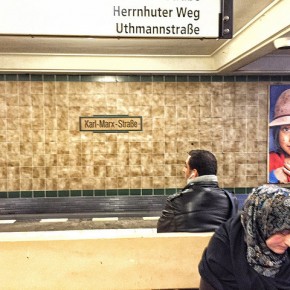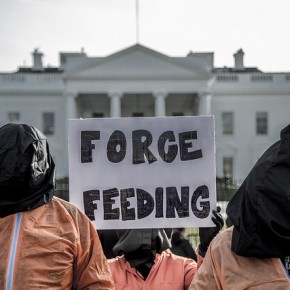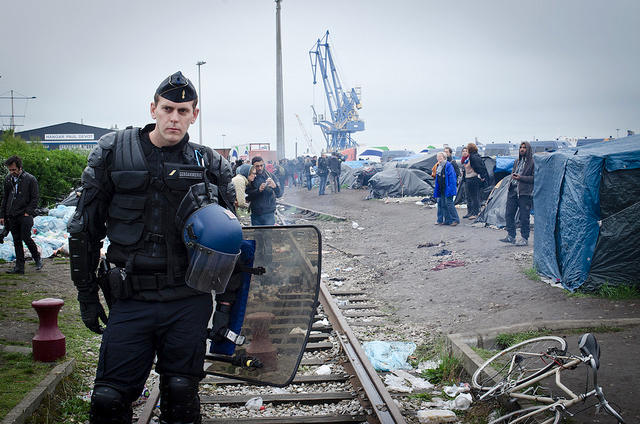On Monday January 25, I joined a migrant rights protest outside the UK Home Office as part of the Holocaust memorial collective Never Again Ever! I am often asked why I, as a Sunni Muslim of Pakistani descent, would join a diverse group of activists to push the boundaries on how we remember the Holocaust. I see it as politically consistent with principles outlined by Ali Shariati prior to the Islamic Revolution.
First, the event itself. We were inspired by photographs from the death camps to leave a pile of shoes outside the Home Office. This wasn’t meant to imply that the United Kingdom is a fascist state, nor that Theresa May is a Nazi. Rather, it was a symbolic act of protest that highlighted the parallel between refugees fleeing the rise of fascism, and migrants currently in Europe, many of whom are escaping from Islamic State, and military interventions against it.
Candles were lit, and statements were read by participants. I was moved to hear Ruth Barnett link her experiences as a Kindertransport survivor with those of migrants today. “Refugees would not have come to Europe if we had opened our eyes, minds and hearts to help them preserve their homes and culture many years ago when violence began,” she said. “They had to come because we failed them then. Now they are here, we must not fail them again.”
As she spoke, it occurred to me that through current refugee policy, the European political establishment has proven how meaningless the phrase “Never Again” has really become. Governments continue to reject the lessons of history, and blind themselves to how many mistakes have already been repeated.
After the Gulf War, Security Council Resolution 687 imposed a sanctions regime on Iraq that begs comparison with the Treaty of Versailles. The caricature of asylum seekers being a drain on public finances is a direct continuation of attitudes from World War II. Denmark’s recent law allowing for refugees to be searched for valuables is an obvious repurposing of fascist laws in a liberal framework. As Primo Levi wrote, “Auschwitz is outside of us, but it is all around us, in the air. The plague has died away, but the infection still lingers and it would be foolish to deny it.”
The lingering infection of Auschwitz is exactly why it so important to tackle what fellow organiser, and descendent of four Holocaust survivors, Dan Glass has called “Holocaust piety.” When the Shoah is discussed, mourners are trapped in a paralysing inability to go beyond muttering “Never Again,” rather than discussing what massive political changes are needed to ensure that the statement even means anything.
For instance, how does “Never Again” reflect itself in the fact that the wartime excesses of German capitalism were never critically discussed in the trials of Friedrich Flick, Alfried Krupp, and Carl Krauch? Rather than understanding how the logic of capital accumulation functioned in tandem with Nazi expansionism, a conservative narrative was imposed on West Germany, that was consistent with Cold War politics.
Fascism was totalitarian, and its economic issues were linked to the same central planning that characterised the Soviet Union. It would be healed by a revival of political pluralism, based in free markets. As a result, Holocaust memorials still do not sufficiently reflect on how Nazism, and its nationalist ideology of “blood and soil,” was married to the opportunist greed of German industry. They also ignore that the Holocaust affected more populations than Jews: Roma, Sinti, non-heterosexuals, political dissidents, and many other groups that didn’t match the fascist social ideal were liquidated, too.
It seems clear that when we remember the Holocaust, we need to do so in a manner that moves beyond “Holocaust piety,” which I read as similar to what Ali Shariati described as “Black Shi’ism” in his work Red Shi’ism vs. Black Shi’ism. Shariati raged against the political quietism of his time, expressing his disgust at “piety remaining silent against tyranny. What a shame! What heartlessness and selfishness, that a man should be surrounded by the screams of prisoners, the shouts of executioners, the poverty of the hungry, the whips of the cruel over the bodies of the helpless, and, instead of volunteering to defend them, that he should simply seek his own redemption and try to gain paradise for himself!”
Shariati was rejecting piety as “a means of escape from reality and responsibilities, turning away from the fate of the masses, and ignoring cruelty and tyranny.” Applying him to the Shoah, it is important to reiterate the question, “how is it that the rivers of blood shed by the Mongols in this country, and that the decline threatening Islam and the masses of the people, do not in any way disturb the peace of his soul and the tenderness of [the pious] heart?” There is a Black Shoah as much as there is a Black Shi’ism, one that constitutes a “religion of mourning,” rather than a “religion of bearing witness” that leads to principled resistance that springs from mass grief.
There are obvious limits to this parallel. Shariati’s Black Shi’ism was in response to the deaths of Ali and Hussein, the commemoration of which forms the backbone of Shi’ite ritualism. The Shoah is an entirely different sort of event. The point is more precisely that our memory of the Holocaust must be redefined to emphasise a chaotic grief that disrupts the world around us, rather than the controlled mourning of Holocaust piety. Shariati’s “Red Shi’ism” must emphasise a Red Shoah: one in which the Holocaust is mourned in such a manner that the qualities it brings to the fore disrupt the infrastructure that resulted in the Holocaust in the first place.
For Shariati, Shi’ism wasn’t a religion of “mourning” so much as it was one of “bearing witness” to the qualities of the divine. He viewed these qualities as essentially being the repressed values of social justice that have been meticulously removed from right-wing Holocaust narratives. This is at the expense of how we commemorate the Shoah. Indeed, as Shariati writes in his work Jihad and Shahadat, “… we, as a community, we must be the axis of time; that is to say, we must not be a group cowering in a corner of the Middle East or turning around ourselves, rather than becoming involved in crucial and vital issues, which form everything and make the present day of humanity and tomorrow’s history.”
As a Muslim, when I commemorate the Shoah, I remember the next line of this quote, pressing for an end to Black Holocaust memory: “We should not neglect this responsibility by engaging in self-indulgent repetition. We must be in the middle of the field.”
Considering how often Muslims are accused of being accomplices to the Nazi genocide, such Islamic thinking stands in sharp contrast. Not just for purposes of direct dialogue about the tragedy, with other marginalised groups like Jews and Roma, but also, on the level of worldview. This is a tradition of Islam that would never condone any genocide.
Photograph courtesy of Never Again Ever!





